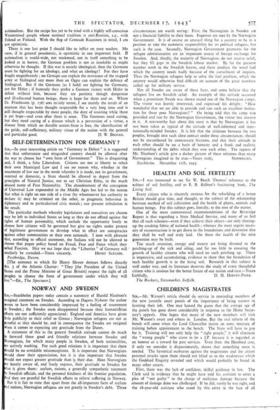NORWAY AND SWEDEN
Sta,—Stockholm papers today contain a summary of Harold Nicolson's marginal comment on Sweden. According to Dagens Nyheter the author seems to have been considerably impressed by a feeling of resentment In Sweden ; the Swedes seem disappointed because their humanithian efforts are not sufficiently appreciated: England and America have given little publicity to their relief to Greece ; Norwegian refugees are not as grateful as they should be, and in consequence the Swedes are resigned When it comes to expecting any gratitude from the Danes.
A statement of this as the general Swedish attitude cannot do much to forward those good and friendly relations between Swedes and orwegians, for which many people in Sweden, of both nationalities, actively working. For such good relations it is important that there ould be no avoidable misconceptions. It is important that Norwegians uld show their appreciation, but it is also important that Swedes d not expect greater gratitude than i5 their due. Most Norwegians e keenly aware of, and freely express, their gratitude to Sweden for at it gives them: asylutn, rations, a generally sympathetic treatment Swedish officials, and the personal kindness of the frontier population. d they are grateful for Swedish efforts to relieve suffering in Norway. But it is fair to state that apart from the all-important facts of asylum d rations, Norwegian refugees are not greatly in Sweden's debt. Three
circumstances are worth noting: First, the Norwegians in Sweden are not a financial liability to their hosts. Expenses arc met by the Norwegian Government. It is of course an unusual thing for a country to be in a position to take the economic responsibility for its political refugees, but such is the case. Secondly, Norwegian Government payments for the refugee administration are an important source of foreign exchange for Sweden. And, thirdly, the majority of Norwegians do not receive relief, but they fill gaps in the Swedish labour market. By far the greatest number work in the Swedish forests, and there produce the wood fuel which the country needs badly because of the curtailment of imports. Thus the Norwegian refugees help to solve the fuel problem, which the country would otherwise find difficult on account of the great numbers called up for military service.
Not all Swedes are aware of these facts, and some believe that the refugees live on Swedish relief. An example of this attitude occurred when a prominent Swede was shown round one of the Norwegian camps. The visitor was keenly interested, and expressed his delight: "How wonderful that we are able to provide and run such an excellent institu- tion for those poor Norwegians! " On being told that the camp was provided and run by the Norwegian Government, the visitor lost interest in it. A noteworthy fact about this story is that by Norwegians it has not been taken as typical of the attitude of well-informed and inter- nationally-minded Swedes. It is felt that the relations between the two peoples, brought into such close contact under these circumstances, should not be encumbered by unnecessary frictions, and that their attitude to each other should be on a basis of honesty and a frank and realistic understanding of the debts which they owe each other. The reports of Mr. Nicolson's article give a darker picture of these relations than many


























 Previous page
Previous page